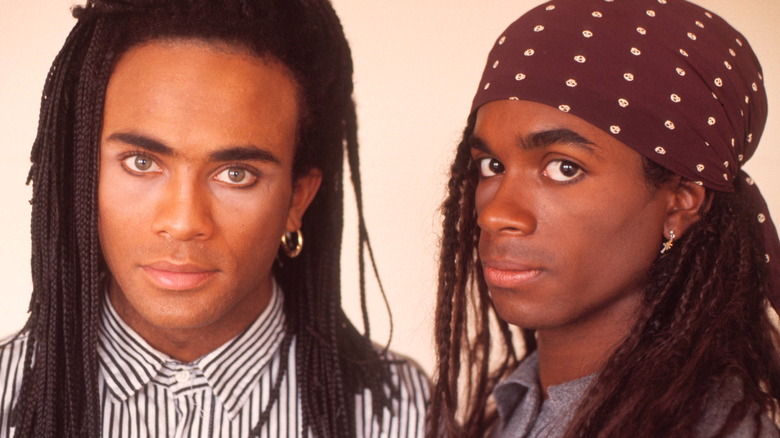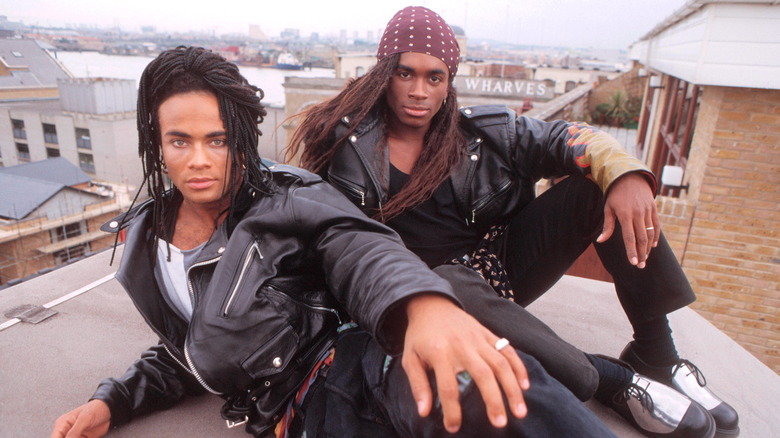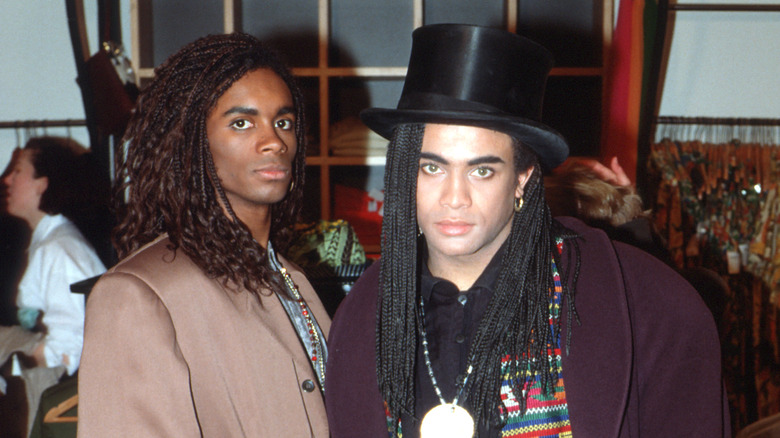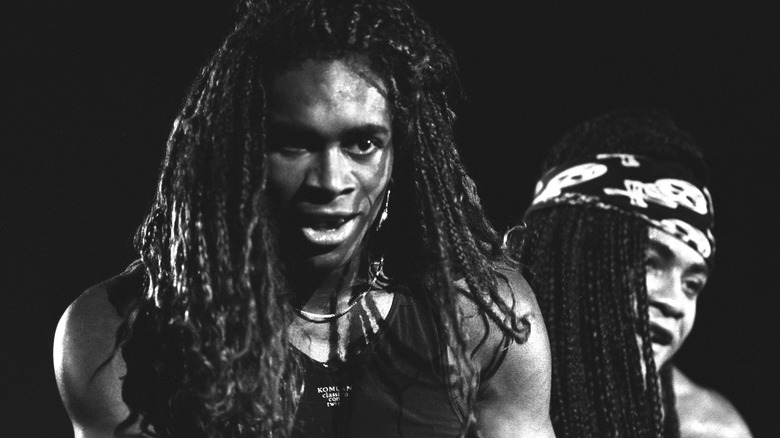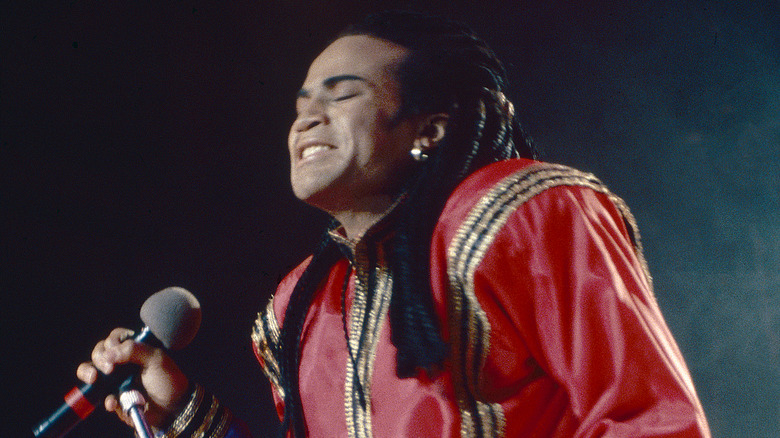The Truth About Milli Vanilli's Lip-Sync Scandal
For a couple of years in the late 1980s and early 1990s, the German pop duo Milli Vanilli were the biggest things in pop music. Their debut album, "Girl You Know It's True," went No. 1, as did its lead single of the same name, and they were followed by a slew of top-charting hits. Meanwhile, the duo of Rob Pilatus and Fab Morvan — with their signature "look" of thigh-high boots, spandex shorts, and cornrow hair extensions — sold out arenas across the world.
However, it was all a house of cards. Neither Pilatus nor Morvan sang a single note on any of their hit singles; the actual vocals were coming via a pair of anonymous session musicians. It was a painful truth that had been hinted at when sound issues bedeviled some of their live performances, and it was completely in the open once the band won a Grammy.
The music industry and the general public's reactions to the news were swift and severe. When the dust had settled, one member of the duo was dead, and another was doomed to spend the rest of his life a pop culture footnote. Meanwhile, the band's name is synonymous with deception and failure, and the music producer who engineered the entire charade came out smelling like a rose.
This is the true story of Milli Vanilli's lip-sync scandal.
Rob Pilatus and Fab Morvan were just trying to make it
Before anyone had ever heard of Rob Pilatus and Fab Morvan, the two were just a pair of anonymous youths trying to make their way however they could in the ghettos of European cities. Pilatus spent the first four years of his life in a Munich orphanage, according to MTV. Meanwhile, Morvan was born in Paris to parents of Guadeloupe descent. The two became fast friends when they met at a dance class, Pilatus told the LA Times. "Something clicked between us. Maybe it's because we're both Black people who grew up in foreign cities that don't have too many Blacks," he said.
The pair tried to find work as backup singers and even recorded an album, although it failed to go anywhere. At one point, the men were so broke they had to steal to eat. "We lived together in a project in Munich. We had little to eat, we were starving," Pilatus said, via The Washington Post.
Producer Frank Farian was looking for his next big thing
While Rob Pilatus and Fab Morvan were trying to find a way out of the Munich ghetto, German record producer Frank Farian, who had already made it big, was looking for his next project.
According to Billboard, Farian was particularly skilled at taking existing vocals and slapping a more marketable face on them. And one night in Munich, he heard the forgotten track "Girl You Know It's True" by Baltimore hip-hop group Numarx and decided he could improve it with the right mix of background vocals, updated music and beats, and most importantly, faces to go with the music.
Farian secured a handful of vocalists and musicians, brought them into the studio, and kept studio heads at a distance so they wouldn't ask awkward questions. According to Biography, he also made sure to hide the identity of the singer by ensuring he recorded at night. "It was a secret," said album engineer Tobias Freund. "We worked in the evening and closed the windows." Soon, he had a hit on his hands. He just needed faces.
Somehow, Pilatus and Morvan crossed his path, and the men were offered a contract — a few thousand dollars — to dance, lip-sync, and most importantly, keep up the charade.
The Milli Vanilli charade worked too well
Every villain in every episode of "Scooby Doo" said the following after the big reveal, "My plan would have worked if it hadn't been for you meddling kids." But in Milli Vanilli's case, it wasn't cartoon teenagers that brought down their act. It was the fact that it became too big for the feet of clay on which it was built.
With just about every single they released becoming a No. 1 hit, and with talk of awards from the music industry, Milli Vanilli's secret became harder to keep by the day. The first crack in the foundation came on July 21, 1989, when the band was performing live in Connecticut. The audio track failed, causing the lyrics to skip over and over again, while Pilatus stood there, dumbfounded, until he simply ran off the stage, according to the LA Times.
There were other clues, too, according to Biography. Somehow fans failed to notice that Pilatus' and Morvan's speaking voices sounded nothing like their singing voices, especially considering Morvan's thick French accent. Only when the group won their Grammy did the house of cards fully tumble down.
Then it was all over
With Grammy awards in their hands, and already whispers in the media that they were cheating, Pilatus and Morvan had enough. As Biography reported, the pair went to Farian with an ultimatum: Let them sing their own vocals on their next album, or they're out. "We said to Frank Farian, 'You don't let us sing on the album. Don't do this anymore.' We don't want to live like this," Pilatus later said.
Farian wasn't having it, according to The Washington Post, forcing Milli Vanilli to go public. The backlash was intense and immediate. Pilatus and Morvan, already adjacent to being laughingstocks in the popular culture, were effectively canceled. Milli Vanilli was forced to return their Grammy. Farian no longer wanted anything to do with them.
"To lose everything so publicly was harsh. You don't know where to turn to because there's nobody around you, you're left alone. We were famous and now we're infamous just like that." Morvan later said on "Oprah: Where Are They Now?" in 2013.
The aftermath
In the 30 years since the Milli Vanilli scandal, the music industry has changed its tune (no pun intended) on lip-syncing. But that gradual acceptance came far too late for the men of Milli Vanilli. Rob Pilatus, according to Entertainment Weekly, spent the following decade struggling with failure, as well as experiencing substance abuse and brushes with the law. He died in 1998 of a drug overdose. "Rob Pilatus didn't deal well with humiliation — being punched every day in the public eye levels marks," Fab Morvan explained on "Oprah: Where Are They Now?" in 2013.
Morvan has done slightly better, according to his website. He's spent the ensuing decades in the music industry, doing lower-profile projects, as well as public speaking engagements. Of course, he still had his difficulties. "The years after the scandal broke, it was a difficult time, because I was trying to rehabilitate myself to civilian life," he said on "Oprah. "I stayed in for years. I only went out to eat."
Frank Farian's involvement in the Milli Vanilli controversy effectively came and went with no real damage to his career. He continued to produce popular bands well into the late 1990s, according to Swiss Charts. Meanwhile, the "crime" that cost Milli Vanilli their careers — lip-syncing — is just an accepted part of the music industry these days. It happens at major, live awards shows; it happens at the Super Bowl; it sometimes happens in concert. According to Saving Country Music, it's kind of an open secret, and while not all fans, critics, and even other musicians are on board with it, it is no longer the career destroyer that it once was.
